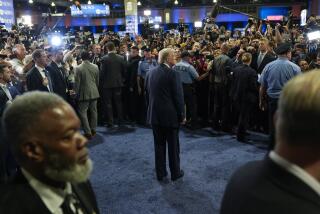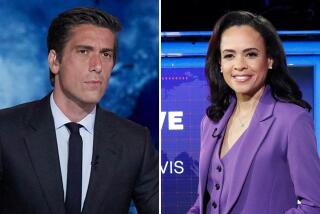Deal on Debates Is Near, Officials Say : Politics: Bush, Clinton would meet three times under proposed format. Quayle and Gore would face off once.
WASHINGTON — Aides to President Bush and Arkansas Gov. Bill Clinton were on the brink of an agreement to hold presidential debates as they adjourned negotiations late Thursday.
“We have made substantial progress on the basic terms of an agreement, including the number of debates, the debates and the format,” Robert M. Teeter, chairman of the Bush campaign, said when the two sides broke for the night.
They had been locked in a marathon session in which both sides tried to finesse any psychological advantage in format and schedule to help their causes.
‘I’m encouraged,” said Mickey Kantor, Clinton’s campaign chairman. Neither side would give details.
But a source familiar with the discussions, who spoke on condition of anonymity, said negotiators were looking at a plan to hold three presidential debates and one between the vice presidential candidates.
One of the debates was said to involve a panel of questioners, one would involve a single moderator and the third would involve a combination of both formats.
The dates were unknown, but one source said they might begin Oct. 11 and would be completed within 12 days of that date.
“They say they are making substantial progress, and they hope they can work it out,” Clinton said in brief remarks at the airport in Madison, Wis., Thursday night as he prepared to leave for Toledo, Ohio.
Teeter and Kantor said both sides would meet again today to hammer out the final details of the agreement, which they said would be announced Saturday morning.
The biggest sticking point was over timing, sources said. The Bush campaign wants the last debate as close to Election Day as possible, hoping it will keep public opinion about the race fluid and thus possibly help the President, who is now trailing in the polls.
Clinton negotiators contended that the last debate should be Oct. 18, two weeks before the election, believing that this would freeze public opinion with Clinton still ahead.
To that, a White House source said, the President’s negotiators said: “No way.” Clinton negotiators were said to have been holding fast.
But the Bush camp had apparently compromised and offered four alternative dates, sources said, none of them on weekends.
Clinton had objected that Bush’s earlier proposal for Sunday debates threatened to conflict with the major league baseball playoffs and the World Series.
At the same time, both sides reiterated that on-again candidate Ross Perot was invited to join in the debates, though neither side invited him to enter the negotiations.
The debate negotiations began at 8 p.m. Wednesday and continued until midnight in Kantor’s downtown Washington law offices.
They resumed at 8:30 a.m. Thursday and continued all day, minus a brief lunch break, until nearly 11 p.m.
For the most part, both sides tried to remain closed-mouthed about what they were seeking in the negotiations.
“We’ll see,” was all Teeter said as he walked past reporters into the Thursday morning session.
“Working hard,” said Kantor, as the two sides resumed talks after the midday break.
Analysts believe that Bush needs the debates more than Clinton. Bush may also be helped by Perot’s presence at the debates because Perot could split the anti-Bush vote.
Clinton, meanwhile, can benefit from the debates by appearing as an equal to Bush and getting the opportunity to blunt attacks the Republicans have mounted.
Most analysts believe that the Clinton campaign wants to force Bush to accept some compromise--at least for the psychological advantage of saying they won something.
The last public proposal was offered by the President on Tuesday, when he challenged Clinton t o debate every Sunday from Oct. 11 until two days before the election.
He proposed two debates with a single moderator, a format suggested by the bipartisan presidential debate commission and accepted by Clinton.
But Bush said he also wanted two more debates with a panel of three journalists asking questions, the format used in 1988.
He also called for two encounters between Vice President Dan Quayle and Clinton’s running mate, Tennessee Sen. Al Gore.
Throughout the day Thursday, Clinton repeatedly criticized Bush for refusing to go along with the debate commission’s recommendations, lamenting that the Republicans sought “secret” meetings to discuss the particulars of the debates.
“Those things are now being negotiated--because George Bush insisted--in private by politicians instead of in public by the nonpartisan debate commission,” Clinton told reporters in Milwaukee.
“That’s what I wanted all along, but George Bush wouldn’t let it happen. We’ve already missed three debate opportunities. We’ll just have to see what happens. I can’t say.”
Bush spent Thursday morning at Camp David, Md., and did not comment on the debate meetings.
The President’s debate preparation team is led by Budget Director Richard G. Darman and includes White House domestic adviser David Ross and speech writer Andrew Carpendale, as well as aides to Darman and others.
The Clinton campaign has already spent considerable effort on debate preparation.
Since late summer, Tom Donilon, a veteran Democratic operative, has headed a group that has prepared extensive briefing books and other material to familiarize Clinton with details of Bush’s record. Clinton has also started watching videotapes of past Bush debates.
The Clinton campaign has not yet begun formal debate rehearsals, but aides say such sessions are likely to start soon.
Times staff writers David Lauter, James Gerstenzang and Cathleen Decker contributed to this story.
Comparing the Campaign Dollar
Comparison of campaign spending by Gov. Bill Clinton, Ross Perot and President Bush over the last six months.
Source: Associated Press, Federal Election Commission
Today on the Trail . . .
Gov. Bill Clinton campaigns in Ohio and Michigan.
President Bush campaigns in Boston.
TELEVISION
President Bush appears live on ABC’s “Good Morning America” show at 7:30 a.m. PDT.
Ross Perot is a guest on ABC’s 20/20 show at 10 p.m. PDT.
More to Read
Get the L.A. Times Politics newsletter
Deeply reported insights into legislation, politics and policy from Sacramento, Washington and beyond. In your inbox three times per week.
You may occasionally receive promotional content from the Los Angeles Times.










